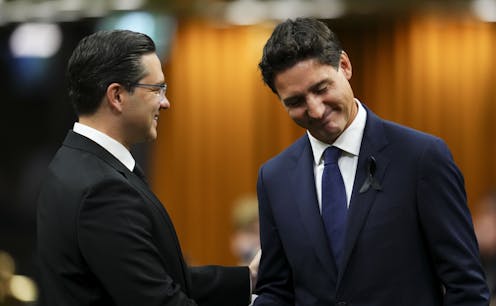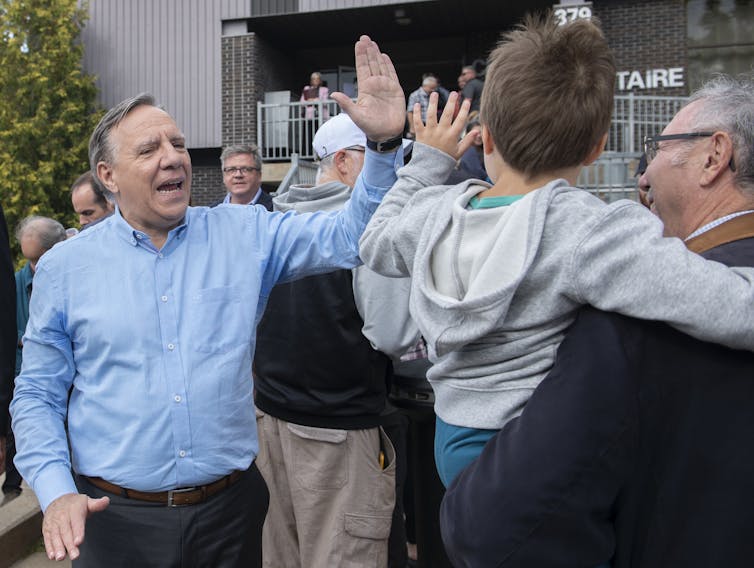
The recent selection of Pierre Poilievre as Conservative leader and Justin Trudeau’s announcement that he will lead the Liberals into the next federal election has started a chain of events that will play out over the next 12 months.
After that Canadians can expect another federal election.
During the past century, no minority government has lasted three years; most far less. Trudeau’s current minority isn’t likely to break any longevity record.
The confidence-and-supply agreement negotiated earlier this year between the Liberals and NDP was aimed at ensuring the Liberal minority governs to 2025. But the agreement isn’t binding, and it will probably falter sooner rather than later. Both parties will want their independence or else Poilievre will depict them as interchangeable.
The Conservatives will need a year to develop a new policy platform and adjust to their new leader. The result will likely be a more centrist party than the one that elected Poilievre. That’s because the party has to get votes from those who rejected it in 2021 if it hopes to form the next government.
Avoiding austerity measures
The new Conservative platform will likely entail a smaller, and smarter, hand for the state, but probably won’t contain slash-and-burn proposals. No party in recent federal elections has advocated austerity measures.
Similarly, provincial election campaigns, such as in Ontario earlier this year and currently in Québec, show that parties of all stripes are unwilling to run on a platform that explicitly reduces benefits, or even makes realistic proposals for a balanced budget in the short term.

Trudeau’s Liberals will probably shift to the right over the next year, seeking to occupy as much of the political spectrum as possible by squeezing the NDP on the left and the Conservatives on the right. The party will work hard to demonstrate to voters that it is a sound steward of economic prosperity.
Both parties will prioritize urban voters in Toronto, Montréal and Vancouver. Election after election has shown that as long as most ridings in these cities vote Liberal, the party cannot be denied power, either as a majority or minority.
An early move by Conservatives to shore up support in voter-rich Ontario is the hiring of the executive director of Ontario’s Progressive Conservative party, Mike Crase, as the new executive director of the federal Conservatives.
Weak, rudderless?
Once a year is up, the current minority government may totter on its last legs. That’s because if the Liberals shift to the right, the NDP will have less reason to support the minority government. And Trudeau will likely be loath to be portrayed by Poilievre as being in bed with the NDP. It will be easy for the Conservatives to paint Trudeau as weak, rudderless and only in power due to the NDP.
Once 2023 rolls around, Trudeau will probably be eager to battle the still inexperienced Poilievre. At the same time, the new leader of the opposition will likely savour the opportunity to take on a prime minister seeking a fourth mandate.

Neither will have any reason to prefer waiting another two years before seeking a mandate from voters. Like boxers who spar as long as they can, they will be keen to strike a knockout punch as soon as the opportunity arises.
The Conservatives and the Liberals will both paint the election as a referendum between stark opposites, even if their election platforms probably won’t be very dissimilar.
With higher interest rates and soaring inflation, all parties will position themselves as guardians of the well-being of the middle class and working Canadians. It is via this guardianship that the parties will seek to differentiate themselves and appeal to specific groups of voters.
In calling another election the Liberals, as the incumbents, would control the exact timing. Of the past five elections, four were held in September or October. Elections during these months permit campaigning during pleasant late summer and early fall weather and don’t interfere with the summer plans of voters. Late spring elections are also common for the same reasons.
The unknowns
Of course, in political life there’s always uncertainty. Like his father did, Trudeau might go for a walk in the snow this winter and conclude that 15 years as MP, 10 years as Liberal leader and nearly eight as prime minister is enough.

If so, Trudeau might delay the next election as long as possible to provide time for a successor, such as Chrystia Freeland or Mélanie Joly, to assume the party’s leadership.
Or a scandal might threaten one of the party leaders.
Less likely, but not entirely improbable, is a splintering of the Conservative party along ideological lines. A natural disaster or international events could also change the calculus and delay the next election.
Nonetheless, an election in the fall of 2023 or spring of 2024 is probably what Canadians can expect — or dread.
Thomas Klassen does not work for, consult, own shares in or receive funding from any company or organization that would benefit from this article, and has disclosed no relevant affiliations beyond their academic appointment.
This article was originally published on The Conversation. Read the original article.







